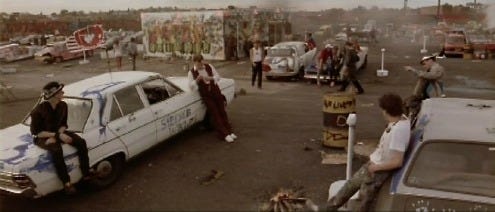Dead End Drive-In (1986)

My neverending curiosity for a little known subgenre dubbed "Ozploitation" — low-budget horror, action and comedy films set in Australia — led me to this 1986 post-apocalyptic gem.
The film takes place in the futuristic 1990s (no, seriously), where unemployed transient punks are rounded up and sequestered in a drive-in turned concentration camp. Given the recent collapse of the economy, "Dead End Drive-In" features a world in which criminals run rampant and where cars are commoditized due to the failing manufacturing industry. Cars are fought over and guarded to the death seeing as how everyone is a part of some sort of vehicular gang. Escape from the drive-in is uhh … how should I put this … well, let’s just say this is no Alcatraz. When Jimmy (aka Crabs) decides to take his girlfriend Carmen out to the movies, he finds that his night of romance has turned into an extended stay as his tires are stolen right off his car.
The drive-in is operated by the Aussie government in order to contain the growing number of delinquents. The prisoners are provided with such luxuries as food stamps to be used at the concession stand and nightly midnight screenings of movies; drugs and booze are made readily available as well. The no-good punk kids are kept in detention via an electrified fence and a fairly incompetent front guard. If anything though, the hoard of young people is not so much held against its will as it is just fully appeased with life in squalor — which is where the socio-political commentary comes into play.
The idea of the unemployed and the disenfranchised being squared off — and contained with all the junk food they can eat and all the vices they can stand — is not too far off base with how young people today are essentially left with less and less opportunity. Meanwhile, there also exists a fear of the unknown in the camp, which is presented not so subtly under the guise of racism. This fear is manifested against Asians specifically, who have migrated to Australia and are seemingly to blame for the state of the economy (a plot point that is never really explained).
As irrational as it may sound, this fear mirrors the social climate of Australia in the 1980s, an era which saw a slew of anti-racist acts being passed as well as anti-immigration political groups gaining support due to the country's multi-ethnic background. Don't get me wrong; I'm not saying that "Dead End Drive-In" is by any means a smart film. In fact, it's schlocky and absurdly ridiculous throughout yet definitely a product of its time (hence the pseudo-social commentary). The majority of the film is strung together by a series of ridiculous gags involving the misfits and their inability to maintain any sort of cohesiveness other than their shared blind racism.
The movie also has the whole film-within-a-film vibe going as well. Of course, given the title, the backdrop of every major scene is set to a multitude of Aussie B-movies cast on the giant screen in the middle of the camp. These movies act as more than just a background setting, though; I saw it as more of a clever commentary on the the kind of audience these movies attract. To have an "Ozploitation" movie in which misfits are forced to watch B-movies and eat fast food is a brilliantly apropos interpretation of the film's own demographic.
I honestly believe this movie to be the perfect popcorn flick. It's funny, self-referential without being pretentious and, best of all, incredibly campy. There's a ridiculous amount of car stunts and explosions as big as the hair. "Dead End Drive-In" is everything a cult movie should be. If I were forced to give an accurate description, I would say that it is essentially "Class of 1984" meets "Red Dawn." Proceed accordingly.


